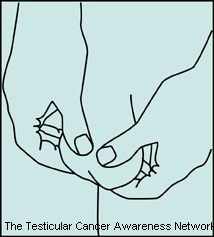|
Disclaimer: This content is reviewed periodically and is subject to change as new health information becomes available. The
information provided is intended to be informative and educational and is not a replacement for professional medical evaluation,
advice, diagnosis or treatment by a healthcare professional.
Testicular self-exam is a screening test used to check for abnormal growths on the testicles. Testicular cancer is the number
one cause of cancer deaths in young men ranging from age fifteen to thirty-four. It is important to perform regular self-exam
because this cancer can be cured when found early.
Self-exam should be performed by all men monthly, starting in the teen years. The purpose of the exam is to detect any
unusual lumps, swellings, tenderness, or excess fluid in or around the testicles.
To perform the exam:
* Stand in front of a mirror and examine the testicles for any signs of swelling.
* Roll the testicles between the thumb and forefinger, feeling for any unusual lumps.
* Examine the cord-like areas on the top and back of the testicles for any abnormal thickenings.
* Examine the testicles for changes in firmness, swelling, accumulation of fluid, or tenderness.
Growths that you may notice may not be cancer. Testicular cancer grows rapidly. Report any changes to your healthcare
provider soon. Remember, this cancer is highly curable when caught early.

|

